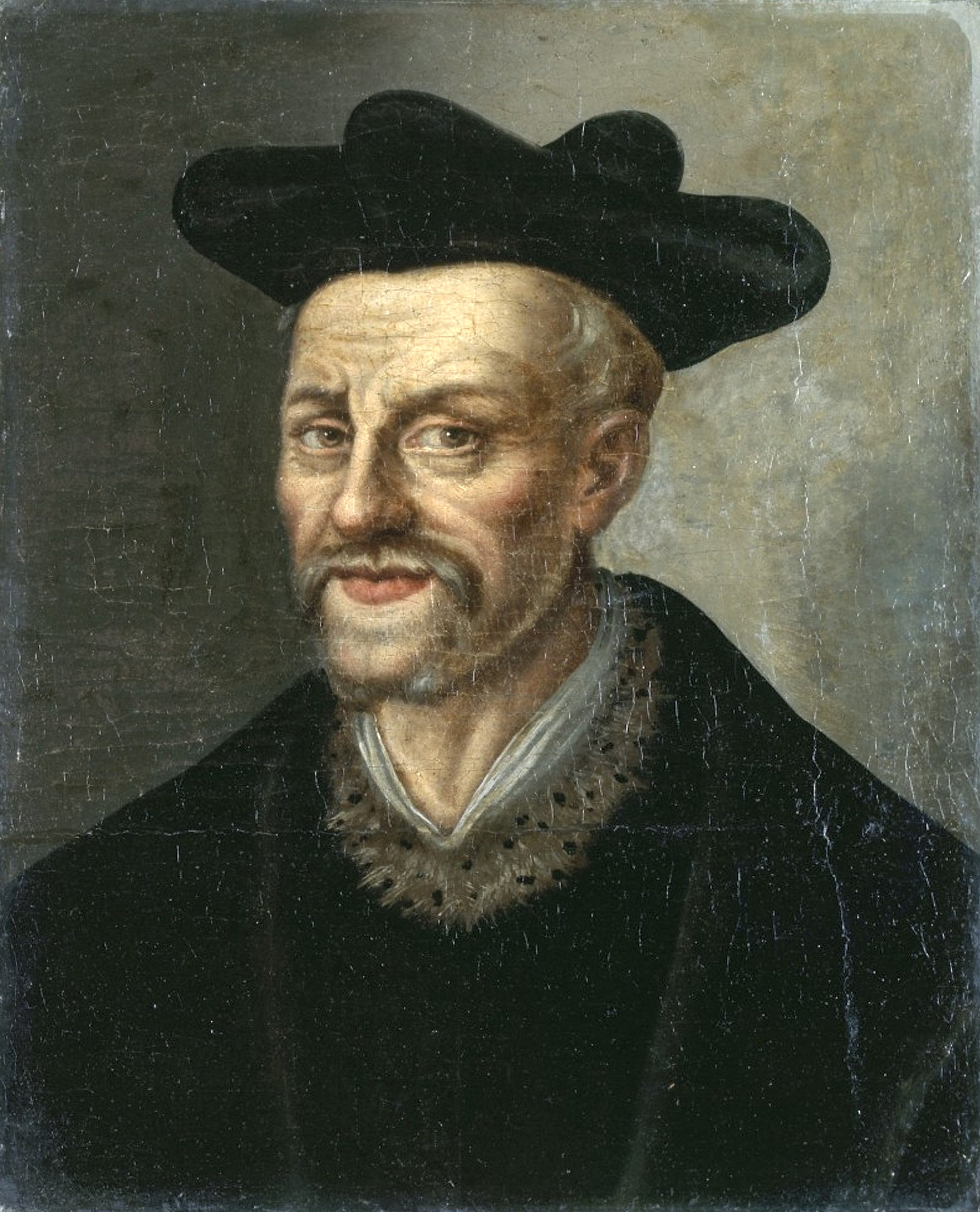Francois Rabelais Frases famosas
“Conheço muitos que não puderam quando deviam, porque não quiseram quando podiam.”
citado em "Duailibi Essencial: Minidicionário com mais de 4.500 frases essenciais" - Página 303, Roberto Duailibi, Marina Pechlivanis, Elsevier Brazil, 2006, ISBN 8535219579, 9788535219579 - 496 páginas
Atribuídas
Variante: Conheço muitos que não puderam quando deviam porque não quiseram quando podiam.
“O vinho tem o poder de encher a alma de toda a verdade, de todo o saber e filosofia.”
le vin possède le pouvoir de remplir l’âme de toute vérité, de tout savoir et de toute philosophie.
Oeuvres complètes, Volume 7 de Oeuvres de François Rabelais - Página 909, François Rabelais, Abel Lefranc - H. et E. Champion, 1913
Citações de homens de Francois Rabelais
“O bom vinho alegra o coração do homem.”
le bon vin réjouit le cœur de l'homme
"Le Tiers livre" - Página 482; de François Rabelais, Pierre Michel - Publicado por le Livre de poche, 1966 - 542 páginas
“Um homem nobre nunca odeia um bom vinho: é um preceito monarcal”
Jamais un homme noble ne hait le bon vin : c'est un précepte monacal.
"Oeuvres complètes Gargantua Pantagruel Le tiers livre Le quart livre Le cinquième et dernier livre Lettres et oeuvres diverses Gargantua Pantagruel Le tiers livre Le quart livre Le cinquième et dernier livre Lettres et oeuvres diverses" - Página 11; de François Rabelais, Guy Demerson, Michel Renaud, Geneviève Demerson - Publicado por Editions du Seuil, 1995 - 1579 páginas
Francois Rabelais frases e citações
“Tudo chega com o tempo, para quem sabe esperar.”
Tout vient à point, qui peut attendre
"Rabelaesiana", in: "Oeuvres de F. Rabelais" - Página 648 http://books.google.com.br/books?id=l_x9AAAAIAAJ&pg=RA6-PA648; de François Rabelais - Publicado por Ledentu, 1835 - 677 páginas
“Pouco tenho, devo muito, o resto fica para os pobres”
em seu testamento
I owe much — I possess nothing — I give the rest to the poor
"The Parterre", volume 2, página 40 http://books.google.com.br/books?id=2k8AAAAAYAAJ&pg=PA40; Publicado por E. Wilson, 1835
Variante: O meu sonho é dever muito, não ter nada e, o resto, deixar para os pobres.
Francois Rabelais: Frases em inglês
“He that has patience may compass anything.”
Fonte: Gargantua and Pantagruel (1532–1564), Fourth Book (1548, 1552), Chapter 48.
“Do not believe what I tell you here any more than if it were some tale of a tub.”
Fonte: Gargantua and Pantagruel (1532–1564), Fourth Book (1548, 1552), Chapter 38.
“You have there hit the nail on the head.”
Fonte: Gargantua and Pantagruel (1532–1564), Third Book (1546), Chapter 34.
“Let us fly and save our bacon.”
Fonte: Gargantua and Pantagruel (1532–1564), Fourth Book (1548, 1552), Chapter 55.
En toutes compagnies il y a plus de folz que de sages, et la plus grande partie surmonte tousjours la meilleure.
Chapter 10 http://books.google.com/books?id=wfRKAQAAIAAJ&q=%22En+toutes+compagnies+il+y+a+plus+de+folz+que+de+sages+et+la+plus+grande+partie+surmonte+tousjours+la+meilleure%22&pg=PA285#v=onepage.
Gargantua and Pantagruel (1532–1564), Pantagruel (1532)
Fonte: Gargantua and Pantagruel (1532–1564), Fourth Book (1548, 1552), Chapter 38.
“What cannot be cured must be endured.”
Fonte: Gargantua and Pantagruel (1532–1564), Fifth Book (1564), Chapter 15.
“I drink no more than a sponge.”
Fonte: Gargantua and Pantagruel (1532–1564), Gargantua (1534), Chapter 5.
“What is got over the Devil's back is spent under the belly.”
Fonte: Gargantua and Pantagruel (1532–1564), Fifth Book (1564), Chapter 11.
“Scampering as if the Devil drove them.”
Fonte: Gargantua and Pantagruel (1532–1564), Fourth Book (1548, 1552), Chapter 62.
“We saw a knot of others, about a baker's dozen.”
Fonte: Gargantua and Pantagruel (1532–1564), Fifth Book (1564), Chapter 22.
“You are Christians of the best edition, all picked and culled.”
Fonte: Gargantua and Pantagruel (1532–1564), Fourth Book (1548, 1552), Chapter 50.
Fonte: Gargantua and Pantagruel (1532–1564), Fifth Book (1564), Chapter 15.
“Above the pitch, out of tune, and off the hinges.”
Fonte: Gargantua and Pantagruel (1532–1564), Fourth Book (1548, 1552), Chapter 19.
Fonte: Gargantua and Pantagruel (1532–1564), Fifth Book (1564), Chapter 20 : How the Quintessence cured the sick with a song
“By robbing Peter he paid Paul, … and hoped to catch larks if ever the heavens should fall.”
Fonte: Gargantua and Pantagruel (1532–1564), Gargantua (1534), Chapter 11.
“This flea which I have in mine ear.”
Fonte: Gargantua and Pantagruel (1532–1564), Third Book (1546), Chapter 31.
“The Devil was sick,—the Devil a monk would be;
The Devil was well,—the devil a monk was he.”
Fonte: Gargantua and Pantagruel (1532–1564), Fourth Book (1548, 1552), Chapter 24.
Prologue.
Gargantua and Pantagruel (1532–1564), Gargantua (1534)
“You shall never want rope enough.”
Author's prologue.
Gargantua and Pantagruel (1532–1564), Fifth Book (1564)
“I believe he would make three bites of a cherry.”
Fonte: Gargantua and Pantagruel (1532–1564), Fifth Book (1564), Chapter 28.
“Subject to a kind of disease, which at that time they called lack of money.”
Fonte: Gargantua and Pantagruel (1532–1564), Pantagruel (1532), Chapter 16.
Fonte: Gargantua and Pantagruel (1532–1564), Fifth Book (1564), Chapter 19 : How we arrived at the queendom of Whims or Entelechy
“The belly has no ears nor is it to be filled with fair words.”
Original: …l'estomach affamé n'a poinct d'aureilles, il n'oyt goutte.
Fonte: Gargantua and Pantagruel (1532–1564), Fourth Book (1548, 1552), Chapter 63.
“Send them home as merry as crickets.”
Fonte: Gargantua and Pantagruel (1532–1564), Gargantua (1534), Chapter 29.
“Thought I to myself, we shall never come off scot-free.”
Fonte: Gargantua and Pantagruel (1532–1564), Fifth Book (1564), Chapter 15.
Et guerre faicte sans bonne provision d'argent, n'a qu'un souspirail de vigueur. Les nerfz des batailles sont les pecunes.
Fonte: Gargantua and Pantagruel (1532–1564), Gargantua (1534), Chapter 44.
“Appetite comes with eating, says Angeston. But the thirst goes away with drinking.”
Fonte: Gargantua and Pantagruel (1532–1564), Gargantua (1534), Chapter 5.
“Thought the moon was made of green cheese.”
Fonte: Gargantua and Pantagruel (1532–1564), Gargantua (1534), Chapter 11.
“He laid him squat as a flounder.”
Fonte: Gargantua and Pantagruel (1532–1564), Gargantua (1534), Chapter 27.
